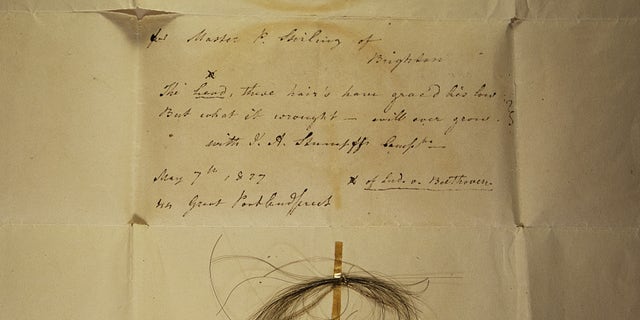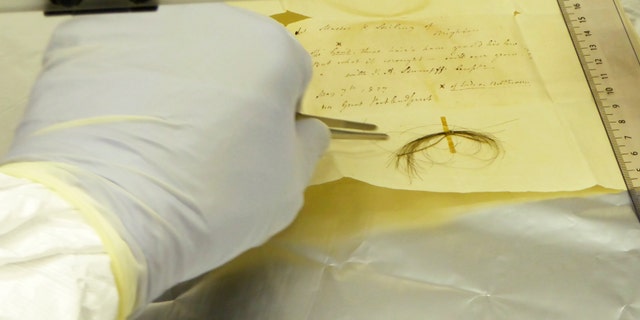[ad_1]
A genetic study conducted on locks of Ludwig van Beethoven’s hair revealed more details about the composer’s death at a relatively young age in March 1827.
The University of Cambridge biological anthropologist Tristan Begg, the lead researcher in the study “Genomic analyses of hair from Ludwig van Beethoven,” which was published in Current Biology on Wednesday, said eight strands of hair attributed to the German musician were tested in hopes of explaining potential underlying genetic and infectious causes of his illnesses.
It was already known that Beethoven, who died at the age of 56 from a protracted illness, began losing his hearing in his 20s and was functionally deaf by his mid-40s. He was also known to have experienced severe abdominal pains and chronic bouts of diarrhea since he was 22.
Though the study did not find a primary cause for his hearing loss or gastrointestinal problems, it shed light on other health issues the composer experienced during his lifetime.
RESEARCHERS SAY BEETHOVEN’S MUSIC EVIDENCE COMPOSER SUFFERED IRREGULAR HEARTBEAT
German composer Ludwig van Beethoven (1770 – 1827) composing the ‘Missa Solemnis’, February-April 1820. Oil painting by August Klober. (Photo by Universal History Archive/Getty Images)
Five of the eight strands of hair tested were found to be “perfect genetic matches” and were deemed “almost certainly authentic,” the study said, allowing researchers to determine Beethoven had a genetic predisposition for liver disease – something that was thought to have contributed to his death.
The testing also discovered that the famous composer had a hepatitis B infection during the months prior to his death, at the least.
Researchers concluded that his genetic predisposition and heavy alcohol consumption presented “plausible explanations” for Beethoven’s severe liver disease.
During the study, researchers also came across an unexpected result as an analysis of Y chromosomes from five living members of the Van Beethoven patrilineage compared with the DNA from Beethoven’s hair revealed a mismatch in paternal ancestry generations before his birth.
“This finding suggests an extrapair paternity event in his paternal line between the conception of Hendrik van Beethoven in Kampenhout, Belgium in c.1572 and the conception of Ludwig van Beethoven seven generations later in 1770, in Bonn, Germany,” Begg wrote.
BABY BEETHOVEN? 5-YEAR-OLD SOUTH FLORIDA BOY A MUSICAL PRODIGY

The Stumpff Lock from which Beethoven’s high-coverage genome was sequenced. The lock is affixed to a letter from Johann Andreas Stumpff to Patrick Stirling, dated May 7, 1827. Stumpff’s poem reads, “The head, these hair’s have grac’d lies low; But what it wrought — will ever grow.” (American Beethoven Society member Kevin Brown via Current Biology)
The study also debunked a forensic investigation completed in 2007 that suggested lead poisoning could have sped up his death, if not the primary cause for the symptoms that ultimately claimed his life.
Though lead poisoning was probable due to drinking from lead vessels and medical treatments of the time that used lead, the hair used to complete that study nearly 16 years ago was found to have come from an unknown woman, not the composer.

This photo provided by researchers in March 2023, shows the Stumpff Lock, from composer Ludwig van Beethoven, in a laboratory at the Max Planck Institute for the Science of Human History in Germany. (Anthi Tiliakou via Online News 72h)
Researchers said the hairs used in the study were gathered from public and private collections during the last six years of Beethoven’s life.
CLICK HERE TO GET THE Online News 72h APP
Following Beethoven’s death on March 26, 1827, various researchers and medical professionals studied the cause of his hearing loss – something the composer requested in writing years prior.
He initially wanted his favorite physician, Dr. Johann Adam Schmidt, to reveal his health struggles to the public, but Schmidt died before Beethoven.
[ad_2]
Source link
